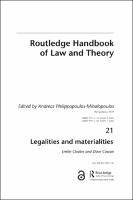Chapter 21 Legalities and materialities
Proposal review
Abstract
This chapter reflects on what materiality-inflected methodologies1 can bring to
an anthropology of law, and to legal studies more generally. Its starting point is an
increasing attention across the social sciences and humanities for objects, and thinking
beyond the human. These have often, but not only, emerged from science and
technology studies (STS), to which we pay particular attention. However, approaches
to materiality have themselves become diversified, and their implications for law can
similarly be read in multiple ways. At the same time, legal anthropology has helped to
re-characterise the complexity of law as a field of social activity by paying attention
to its meanings, for actors within as well as outside its own institutions; to its modes of
action in practice, again within its explicitly designated spaces as well as its everyday;
to its unexpected forms, patterns and directions; to its multiplicity and uncertainty.
Approaches within a broadly defined ‘legal anthropology’ agenda have provided tools
to move away from grand and removed theorisation of the law, or an exclusive attention
to its own claims, and towards a subtler understanding of law as a relatively fluid,
changing and uncertain set of practices. While doing so, legal anthropology has also
reminded us of the significance of empirical research to identify and theorise the
complex existences of law, a contribution which echoes some of the implications of
materiality-oriented theories.
Keywords
law; philosophy; anthropology; law; philosophy; anthropology; Donna Haraway; Ethnography; Fractal; Legal anthropology; Legal consciousness; Ontology; Social theoryISBN
9781317353003; 9781317352990; 9781317352983; 9781315665733OCN
1076639537Publisher
Taylor & FrancisPublisher website
https://taylorandfrancis.com/Publication date and place
2018Imprint
RoutledgeSeries
Routledge Handbooks,Classification
Anthropology
Law


 Download
Download